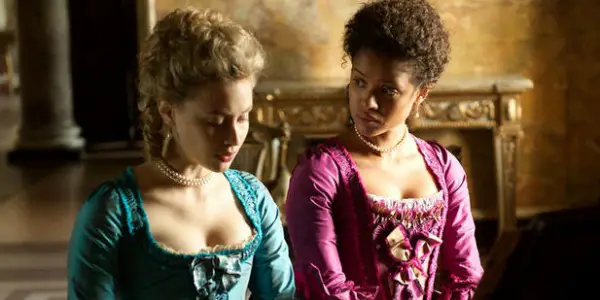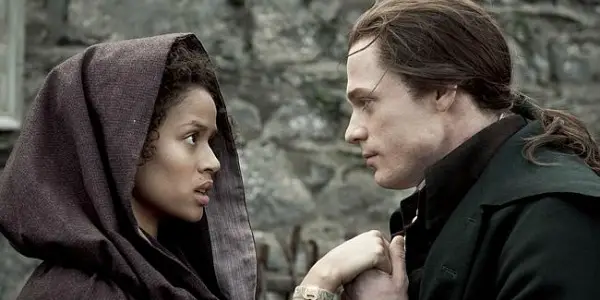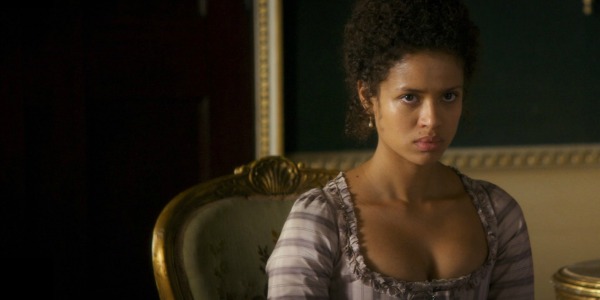BELLE: Too Genteel To Make An Impact

I love film, more than people probably, and I will…
On Belle’s original release, I was intrigued by the film but felt no real urge to watch it. It almost seemed to sell itself on the back of its unusual story: a biracial woman born to aristocracy during the time of the slave trade. However, since then my interest has grown. Such a story, written by a black female screenwriter, directed by a black woman, starring a black actress – these attributes are not at all common.
Belle is about a very real person, a woman named Dido Elizabeth Belle. Belle was born in 1761, the daughter of a slave and a British aristocrat, Sir John Lindsay. He recognised Belle as his daughter, and she went to live on the family estate with his uncle, the first Earl of Mansfield. The film tells the story of how Belle’s colour impacted on her role in society, and her uncle’s involvement with the abolition of slavery.
The film stars the little known actress Gugu Mbatha-Raw as Belle, along with a sterling supporting cast. This was enough to lend the idea that the film might be something understated, but special nonetheless. But as it is I found Belle to be uneven, lacking in depth and not in tune with the history it seeks to portray.
Did This Really Happen?
I had no doubt that the story of Belle was true. While films play around with real stories, the central focus of them usually remains. But there was a lot about Belle that I found hard to believe. She is accepted as one of the family but then is treated like an outsider. She is an equal but then she is below them. Equally people outside of the family swing back and forth in their opinion of her. Although, to be fair, maybe this is likely to have happened – people may have found their relationship with her confusing at such a time.

That being said, there is still a lot about Belle that doesn’t ring true. Belle seems to have a great deal of freedom and while her uncle (played by Tom Wilkinson) is almost always on her side, it seems unlikely that she would have gotten away with so much. A young woman sneaking out on her own. A young black woman at that, in a time when her safety might not have been assured. She even sneaks into the gallery at the law courts. I imagined women wouldn’t have been allowed at this point, but I have no facts on which to base this.
While I don’t mind some fictional adjustments, when a film purports to be telling a historical story and it is not even close, this bothers me. While Mansfield did have a great impact on the abolition of slavery, Belle’s involvement in it is of no note. Davinier, a law student of Mansfield’s, whom Belle later married, was in reality a French, gentleman’s steward. Her cousin Elizabeth Murray was actually not as poor as the film makes out, and Belle not as rich, until a number of relatives had died.
This taking and reshaping of important facts I feel shows a lack of devotion to telling Belle’s story correctly. It is easy to create a dramatic, romantic version of events. But when it comes to such an important and intriguing story I feel like this is letting the subject matter (Belle) down.
A Good Story
While a lot about the historical realities of Belle don’t ring true, the film as a whole is well written. The narrative flows well, and the integration of Belle and Davinier’s romance with her uncle’s judgement of the famous Zong massacre is well plotted. However, the awkward flipping back and forth on Belle’s place in society puts the viewer in a confusing position. Is she accepted, or is she tolerated because she is a gentle sort of girl? Belle actually worked for Mansfield as a sort of clerk. But the film doesn’t mention that she was paid a good wage for this, veiling the fact that she did indeed work for him.

Reading up on the history, it would seem that Belle’s illegitimacy and poor social station was actually more of a feature in how she lived in the household, rather than her colour. Perhaps that is why the film appears so uneven in its treatment of her. She goes out to parties with the family but then is not invited to dine with them? Blending this kind of fact and fiction is confusing, and stops the audience from ever really understanding Belle’s place in the scheme of things.
An Uneven Film
While the story moves along at a good pace and there is enough to keep a viewer’s interest, the tone of it is just too uneven to really pull you in. The chemistry between Mbatha-Raw and Sam Reid (who plays Davinier) is very good. But the relationship between Belle and Davinier takes too much from the stereotypical period romance. Their stolen moments and looks are powerful, but the intensity of these moments and the surprising emotions of the actors make them incongruous with the rest of the film.

Mbatha-Raw is good as Belle, but your understanding of her is uncertain. She is by turns more genteel (too much in fact), then boisterous. You are never sure what she’s thinking and as such a lot of her emotion seems out of character. This lack of understanding means you never really sympathise with her or her position. The supporting cast fare better, but then they are never given much space to really delve into the emotions of their characters, and sometimes lines are delivered just a little too clinically.
Although, Tom Felton is very good as James Ashford. While the character is kind of stereotypical, Felton manages to create a three-dimensional person. In comparison, Belle and Davinier’s emotions are unfathomable, whereas Oliver Ashford (played by James Norton) is too shallow to ever really be of interest.
A lot about what makes Belle two-dimensional and emotionally uneven can be found in the script and direction. The script, while okay, is only the second feature for writer Misan Sagay. Equally, this film is only the second feature for director Amma Asante. I feel it is this inexperience that brings the film in just under par. I can see the story that the filmmakers want to tell, and in moments between Belle and Davinier, I find it quite powerful. But its lack of depth, attention to historical detail, and lack of control over the emotional continuity of its characters means it lacks the punch it should have had.
Conclusion
Belle is an okay film. What it lacks in depth it makes up for with an interesting story and a good supporting cast. It also has some interesting things to say, drawing parallels between the freedom of the slaves and the freedom of Belle and Elizabeth. However, what I find disappointing is that there was a very real, emotional story to be told here, and the production kind of missed it. Belle’s life story is told very gently and her status is shown to be just a little bit uncomfortable, and that just makes the whole thing very underwhelming.
Have you seen Belle? What did you think of it?
Belle is available on DVD.
Does content like this matter to you?
Become a Member and support film journalism. Unlock access to all of Film Inquiry`s great articles. Join a community of like-minded readers who are passionate about cinema - get access to our private members Network, give back to independent filmmakers, and more.
I love film, more than people probably, and I will watch pretty much anything. Seriously, anything! I have a postgraduate education in film & have spent an exceptionally long time trying to get inside the film industry. I'm a big believer in treating every film the same, and bringing something new to the film theory table, giving reasons for every argument made. You'll find that I'm an empathetic and fun sort of reviewer, at least, I like to think so. If I'm not watching films I'm doing exceptionally nerdy stuff, like watching documentaries about the history of medicine and collecting photos of old post boxes.













